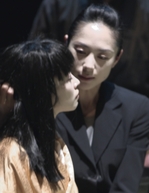SITE GUIDE
SEARCH
REVIEWS
REVIEW ARCHIVES
ADVERTISING AT CURTAINUP
FEATURES
NEWS
Etcetera and
Short Term Listings
LISTINGS
Broadway
Off-Broadway
NYC Restaurants
BOOKS and CDs
OTHER PLACES
Berkshires
London
California
New Jersey
DC
Philadelphia
Elsewhere
QUOTES
TKTS
PLAYWRIGHTS' ALBUMS
LETTERS TO EDITOR
FILM
LINKS
MISCELLANEOUS
Free Updates
Masthead
Writing for Us
A CurtainUp  London Review
London Review
 London Review
London ReviewShun-Kin
|
Our ancestors, forced to live in dark rooms, presently came to discover beauty in shadows, ultimately to guide shadows towards beauty's ends.
— From the essay In Praise of Shadows by Jun'ichiro Tanizaki
|

Yuko Miyamoto, Eri Fukatsu, Yoshi Oida from an earlier performance of Shun-Kin
(Photo: Tsukasa Aoki) |
The main narrative is based on Tanizaki's short story A Portrait of Shun-kin, which describes in pseudo-documentary style the life of a girl from a wealthy family in the 19th century Meiji Era. She is meticulously protected and hidden from the outside world and so her beauty is tantalisingly concealed from daylight and general view. Maliciously blinded as a child, she becomes spoilt and cruel, not least to her devoted serving boy, Sasuke. His unswerving adoration to his mistress means that he accepts her pitiless violence and tyrannical disposition without demur.
The remarkable thing about this production is the non-judgemental tone assumed towards Shun-kin. She is ruthlessly harsh on Sasuke but she is also presented as the rightful object of unadulterated desire and absolute subservience. In this way, the story sits on a borderline between the perverted relationship of fantasy and violence and nostalgia for this shadowy traditional time.
With a modern frame to the action, a woman with her own tangled love life narrates the story for radio. As she reads the script from a tiny, moveable desk with old-fashioned lamp and microphone, the rest of the cast act out the story around her.
This framing device is not the only piece of dramatic innovation, as you would expect from Complicité. There are numerous gestures towards Noh and Kabuki and stunning lighting with clever tricks abound. Japanese script and sepia photographs are projected onto the backdrop whilst the cast create surprisingly detailed scenes with minimalist props and imaginative movement. A fragile-looking puppet, designed by Blind Summit, plays the exquisite but tantrum-prone Shun-kin until the part is gradually morphed into a real actress.
A shamisen player sits onstage and plays throughout, but he is restrained and cleverly interwoven into the play to avoid becoming a distraction. Unfortunately, however, a distraction does appear in the shape of the surtitles. Performed in Japanese, the radio narration is less punctuated than a dialogue-driven narrative would be and it is therefore more difficult for the audience to navigate between translation and action.
Shun-kin may not surpass earlier productions by Complicitéor the high expectations they've created, but this story of dark, twisted love in the beautiful Meiji era is still an alluringly mesmeric piece, performed with pared-down, slick stylization.
|
Shun-Kin
Based on the writings of Jun'ichiro Tanizaki Directed by Simon McBurney With: Kaho Aso, Songha Cho, Eri Fukatsu, Hidetaro Honjo, Yoshi Oida, Yuko Miyamoto, Kentaro Mizuki, Yasuyo Mochizuki, Keitoku Takada, Ryoko Tateishi Composer: Hidetaro Honjo Projection: Finn Ross for mesmer Puppetry: Blind Summit Theatre Set design: Merle Hensel and Rumi Matsui Lighting design: Paul Anderson Sound design: Gareth Fry Costume design: Christina Cunningham Co-produced by Complicité, Setagaya Public Theatre and barbicanbite09 Running time: One hour 50 minutes without an interval Box Office: 020 7638 8891 Booking to 21st February 2009 Reviewed by Charlotte Loveridge based on 9th February 2009 performance at The Barbican Theatre, Silk Street, EC2 (Tube: Barbican) |
|
REVIEW FEEDBACK Highlight one of the responses below and click "copy" or"CTRL+C"
Paste the highlighted text into the subject line (CTRL+ V): Feel free to add detailed comments in the body of the email and state if you'd like your comments published in our letters section. |
|
London Theatre Tickets Lion King Tickets Billy Elliot Tickets Mighty Boosh Tickets Mamma Mia Tickets We Will Rock You Tickets Theatre Tickets |




